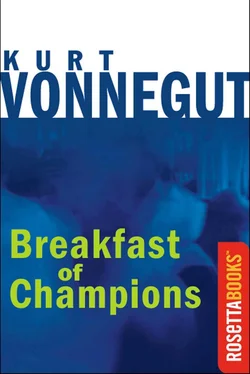Kurt Vonnegut - Breakfast of Champions
Здесь есть возможность читать онлайн «Kurt Vonnegut - Breakfast of Champions» весь текст электронной книги совершенно бесплатно (целиком полную версию без сокращений). В некоторых случаях можно слушать аудио, скачать через торрент в формате fb2 и присутствует краткое содержание. Жанр: Современная проза, на английском языке. Описание произведения, (предисловие) а так же отзывы посетителей доступны на портале библиотеки ЛибКат.
- Название:Breakfast of Champions
- Автор:
- Жанр:
- Год:неизвестен
- ISBN:нет данных
- Рейтинг книги:4 / 5. Голосов: 1
-
Избранное:Добавить в избранное
- Отзывы:
-
Ваша оценка:
- 80
- 1
- 2
- 3
- 4
- 5
Breakfast of Champions: краткое содержание, описание и аннотация
Предлагаем к чтению аннотацию, описание, краткое содержание или предисловие (зависит от того, что написал сам автор книги «Breakfast of Champions»). Если вы не нашли необходимую информацию о книге — напишите в комментариях, мы постараемся отыскать её.
Breakfast of Champions — читать онлайн бесплатно полную книгу (весь текст) целиком
Ниже представлен текст книги, разбитый по страницам. Система сохранения места последней прочитанной страницы, позволяет с удобством читать онлайн бесплатно книгу «Breakfast of Champions», без необходимости каждый раз заново искать на чём Вы остановились. Поставьте закладку, и сможете в любой момент перейти на страницу, на которой закончили чтение.
Интервал:
Закладка:
He was often tempted during all those years of perfect solitude by visions of good times he might have had with food and men and women and children and the marketplace and so on.
His biographer was another Egyptian, Saint Athanasius, whose theories on the Trinity, the Incarnation, and the divinity of the Holy Spirit, set down three hundred years after the murder of Christ, were considered valid by Catholics even in Dwayne Hoover’s time.
The Catholic high school in Midland City, in fact, was named in honor of Saint Athanasius. It was named in honor of Saint Christopher at first, but then the Pope, who was head of Catholic churches everywhere, announced that there probably never had been a Saint Christopher, so people shouldn’t honor him anymore.
A black male dishwasher stepped out of the kitchen of the Inn now for a Pall Mall cigarette and some fresh air. He wore a large button on his sweat-soaked white T-shirt which said this:

There were bowls of such buttons around the Inn, for anybody to help himself to, and the dishwasher had taken one in a spirit of levity. He had no use for works of art, except for cheap and simple ones which weren’t meant to live very long. His name was Eldon Robbins, and he had a penis nine inches long and two inches in diameter.
Eldon Robbins, too, had spent time in the Adult Correctional Institution, so it was easy for him to recognize Wayne Hoobler, out among the garbage cans, as a new parolee. “Welcome to the real world, Brother,” he said gently and with wry lovingness to Wayne. “When was the last time you ate? This mornin’?”
Wayne shyly acknowledged that this was true. So Eldon took him through a kitchen to a long table where the kitchen staff ate. There was a television set back there, and it was on, and it showed Wayne the beheading of Queen Mary of Scotland. Everybody was all dressed up, and Queen Mary put her head on the block of her own accord.
Eldon arranged for Wayne to get a free steak and mashed potatoes and gravy and anything else he wanted, all prepared by other black men in the kitchen. There was a bowl of Arts Festival buttons on the table, and Eldon made Wayne put one on before he ate. “Wear this at all times,” he told Wayne gravely, “and no harm can come to you.”
Eldon revealed to Wayne a peephole, which kitchen workers had drilled through the wall and into the cocktail lounge. “When you get tarred of watchin’ television,” he said, “you can watch the animals in the zoo.”
Eldon himself had a look through the peephole, told Wayne that there was a man seated at the piano bar who had been paid fifty thousand dollars for sticking a piece of yellow tape to a green piece of canvas. He insisted that Wayne take a good look at Karabekian. Wayne obeyed.
And Wayne wanted to remove his eye from the peephole after a few seconds, because he didn’t have nearly enough background information for any sort of understanding of what was going on in the cocktail lounge. The candles puzzled him, for instance. He supposed that the electricity in there had failed, and that somebody had gone to change a fuse. Also, he did not know what to make of Bonnie MacMahon’s costume, which consisted of white cowboy boots and black net stockings with crimson garters plainly showing across several inches of bare thigh, and a tight sequin sort of bathing suit with a puff of pink cotton pinned to its rear.
Bonnie’s back was to Wayne, so he could not see that she wore octagonal, rimless trifocals, and was a horse-faced woman forty-two years old. He could not see, either, that she was smiling, smiling, smiling, no matter how insulting Karabekian became. He could read
Karabekian’s lips, however. He was good at reading lips, as was anyone who had spent any time in Shepherdstown. The rule of silence was enforced in the corridors and at meals in Shepherdstown.
Karabekian was saying this to Bonnie, indicating Beatrice Keedsler with a wave of his hand: “This distinguished lady is a famous storyteller, and also a native of this railroad junction. Perhaps you could tell her some recent true stories about her birthplace.”
“I don’t know any,” said Bonnie.
“Oh come now,” said Karabekian. “Every human being in this room must be worth a great novel.” He pointed at Dwayne Hoover. “What is the life story of that man?”
Bonnie limited herself to telling about Dwayne’s dog, Sparky, who couldn’t wag his tail. “So he has to fight all the time,” she said.
“Wonderful,” said Karabekian. He turned to Beatrice. “I’m sure you can use that somewhere.”
“As a matter of fact, I can,” said Beatrice. “That’s an enchanting detail.”
“The more details the better,” said Karabekian. “Thank God for novelists. Thank God there are people willing to write everything down. Otherwise, so much would be forgotten!” He begged Bonnie for more true stories.
Bonnie was deceived by his enthusiasm and energized by the idea that Beatrice Keedsler honestly needed true stories for her books. “Well—” she said, “would you consider Shepherdstown part of Midland City, more or less?”
“Of course,” said Karabekian, who had never heard of Shepherdstown. “What would Midland City be without Shepherdstown? And what would Shepherdstown be without Midland City?”
“Well—” said Bonnie, and she thought she had what was maybe a really good story to tell, “my husband is a guard at the Shepherdstown Adult Correctional Institution, and he used to have to keep people who were going to be electrocuted company—back when they used to electrocute people all the time. He’d play cards with them, or read parts of the Bible out loud to them, or whatever they wanted to do, and he had to keep a white man named Leroy Joyce company.”
Bonnie’s costume gave off a faint, fishy, queer glow as she spoke. This was because her garments were heavily impregnated with fluorescent chemicals. So was the bartender’s jacket. So were the African masks on the walls. The chemicals would shine like electric signs when ultraviolet lights in the ceiling were energized. The lights weren’t on just now. The bartender turned them on at random times, at his own whim, in order to give the customers a delightful and mystifying surprise.
The power for the lights and for everything electrical in Midland City, incidentally, was generated by coal from strip mines in West Virginia, through which Kilgore Trout had passed not many hours before.
“Leroy Joyce was so dumb,” Bonnie went on, “he couldn’t play cards. He couldn’t understand the Bible. He could hardly talk. He ate his last supper, and then he sat still. He was going to be electrocuted for rape. So my husband sat out in the corridor outside the cell, and he read to himself. He heard Leroy moving around in his cell, but he didn’t worry about it. And then Leroy rattled his tin cup on the bars. My husband thought Leroy wanted some more coffee. So he got up and went over and took the cup. Leroy was smiling as though everything was all right now. He wouldn’t have to go to the electric chair after all. He’d cut off his whatchamacallit and put it in the cup.”
This book is made up, of course, but the story I had Bonnie tell actually happened in real life—in the death house of a penitentiary in Arkansas.
As for Dwayne Hoover’s dog Sparky, who couldn’t wag his tail: Sparky is modeled after a dog my brother owns who has to fight all the time, because he can’t wag his tail. There really is such a dog.
Rabo Karabekian asked Bonnie MacMahon to tell him something about the teen-age girl on the cover of the program for the Festival of the Arts. This was the only internationally famous human being in Midland City. She was Mary Alice Miller, the Women’s Two Hundred Meter Breast Stroke Champion of the World. She was only fifteen, said Bonnie.
Читать дальшеИнтервал:
Закладка:
Похожие книги на «Breakfast of Champions»
Представляем Вашему вниманию похожие книги на «Breakfast of Champions» списком для выбора. Мы отобрали схожую по названию и смыслу литературу в надежде предоставить читателям больше вариантов отыскать новые, интересные, ещё непрочитанные произведения.
Обсуждение, отзывы о книге «Breakfast of Champions» и просто собственные мнения читателей. Оставьте ваши комментарии, напишите, что Вы думаете о произведении, его смысле или главных героях. Укажите что конкретно понравилось, а что нет, и почему Вы так считаете.










